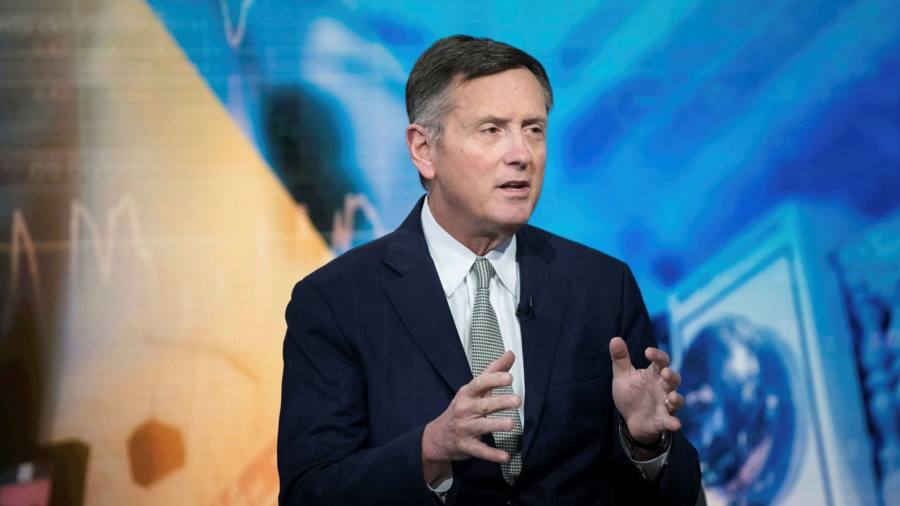Richard Clarida, the outgoing vice-chair of the Federal Reserve, has blamed “inadvertent errors” for failing to reveal the total extent of his buying and selling exercise initially of the pandemic, threatening to reignite an ethics scandal on the US central financial institution.
New disclosures reveal that Clarida — already beneath fireplace for making trades because the Fed was plotting emergency help for the economic system — was extra energetic in monetary markets than he initially divulged.
Clarida, the Fed’s second-in-command, had beforehand disclosed that he moved between $1m and $5m from a bond fund right into a inventory fund on February 27, 2020. These trades had been controversial as a result of they had been made only a day earlier than Jay Powell, chair of the central financial institution, signalled the Fed was getting ready emergency measures to help the economic system.
Nevertheless, amended disclosures, launched by the Fed final month, present that three days previous to the already-reported transactions, Clarida offered between $1m and $5m of shares from the identical inventory fund. The up to date disclosures from Clarida, whose time period expires later this month, had been first reported by The New York Instances.
The revelations are the most recent improvement in a saga that has already compelled the departure of two regional Fed presidents whereas prompting a sweeping overhaul of buying and selling guidelines for prime officers.
“This demonstrates not solely a breakdown within the moral resolution making of a senior policymaker, however within the very procedures and controls meant to watch these policymakers,” mentioned Kaleb Nygaard, a senior analysis affiliate at Yale’s Program on Monetary Stability and a former Fed staffer.
Nygaard added: “The character of scandals like that is that the injury solely will increase with on daily basis that the general public doesn’t hear the total story and the way the Fed plans to repair it.”
When Clarida’s dealings got here to gentle in October, the Fed mentioned they had been a part of a “pre-planned rebalancing” and had prior approval from the central financial institution’s ethics workplace.
A Fed spokesperson declined to touch upon the character of the newly-disclosed transactions, however mentioned the entire investments had been in “authorised holdings of broad-based mutual funds and [exchange traded funds]”.
The transactions had been made exterior of the blackout intervals when officers’ public communications and buying and selling exercise are curtailed, they added.
Norman Eisen, an ethics adviser to the Obama administration who’s on the Brookings Establishment, mentioned the most recent disclosure “calls into query” the preliminary rationalization of Clarida’s trades. He added it was “incumbent” on the outgoing vice-chair to offer extra details about the transactions.
“Frankly, I don’t perceive how promoting out of a fund, failing to reveal that, then shopping for the identical fund once more, all whereas making a revenue and having delicate Fed data, constitutes a ‘rebalancing’, so it’s completely mandatory that he clarify that rationale,” he mentioned.
In a December 15 letter acknowledging the up to date disclosures to the US Workplace of Authorities Ethics, the Fed’s ethics officer mentioned: “Primarily based on my overview of this modification, I proceed to consider that Mr Clarida is in compliance with relevant legal guidelines and laws governing conflicts of curiosity.”
The buying and selling scandal that first erupted in September generated widespread scrutiny and prompted Elizabeth Warren, the progressive Democrat from Massachusetts, to demand that the Securities and Trade Fee launch an investigation into transactions that “replicate[ed] atrocious judgment”.
An impartial authorities watchdog overseeing the central financial institution subsequently opened an investigation.
Two regional Fed presidents, Eric Rosengren of Boston and Robert Kaplan of Dallas, resigned from their positions after they had been discovered to have repeatedly purchased and offered particular person shares and held stakes in a number of funding funds final yr.
Kaplan disclosed holdings value greater than $1m in 27 publicly traded corporations, funds and different investments, together with iPhone maker Apple, Chinese language ecommerce group Alibaba, electrical automobile producer Tesla and telecoms group Verizon. Rosengren held massive stakes in a number of actual property funding trusts.
In a bid to revive its credibility, the Fed in October introduced guidelines that banned its policymakers and senior employees from shopping for particular person shares, limiting any purchases to diversified funding automobiles like mutual funds.
In addition they prohibited them from holding investments in particular person bonds, company securities or getting into into derivatives contracts, whereas introducing tips on when transactions can happen, what number of days’ discover is critical and the way lengthy investments have to be held for.
“This new disclosure about Clarida’s buying and selling exercise raises extra questions about transparency and ethics on the Fed,” mentioned Sarah Binder, a political scientist at George Washington College. “The general public wants to have the ability to belief that the Fed will truly adjust to its personal stricter regime.”
Christina Skinner, an assistant professor of authorized research and enterprise ethics on the Wharton Faculty on the College of Pennsylvania, added: “At a time when the general public is mostly questioning the coverage choices of the central financial institution — and the dimensions of its function extra typically — the Fed have to be particularly conscious of how the general public perceives its actions and choices.”

